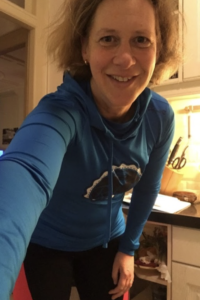Staff at Leiden University: Aranka's story

As long as I work on sustainability, I will persevere and I will not give up. I am 52 years old, married, have two children and a dog. A long time ago I studied Environmental Chemistry in Leiden. I started as an analyst in the lab, but luckily I quickly found a position as an environmental consultant. From environmental permits and legislation I supported universities and teaching hospitals to fulfill their obligations (and apply for permits). I grew into a specialist with a responsibility to implement the environment in my own business processes. Since 2020 I have been the sustainability coordinator at the Real Estate of Leiden University. A very nice team, which takes responsibility for realizing the climate goals for the university. A very nice function, because there is a lot of impact to be made.
I was able to help build LUGO in Leiden as well.
Students are the generation of the future. I think it is important
that they think along about how the university integrates sustainability in their education to become global citizens. Moreover, students are creative and can think "out of the box", so that their diverse input (from different fields of study) can open our eyes. Moreover, I am convinced that we need the young generation to change, they dare more and are not yet stuck in patterns. I do think that LUGO can organize and utilize their network and supporters in Leiden and The Hague even better. LUGO members receive a lot of knowledge from the specialists in the university, learn about political relationships, economic interests of administrators and gain work experience. A few manage to get something up to the level of the Executive Board and actually improve something. That's really cool when that happens and fantastic to be a part of.
As a child I was already plowing floating waste and I was concerned with animals. In this way I also want to contribute to limiting the climate crisis and not sit still. My trip, sailing with my family for a year to the Caribbean (2014/2015) also contributed to this. You can be so happy with so little (travel on the wind and energy from solar panels and windmill). The actual view of the raw materials policy became so visible during this trip (mainly China, which uses its people for their own gain, smart political and economic efforts in countries rich in raw materials). And the unique contacts with whales, dolphins and sea turtles make you intensely happy and you wish everyone. To make such a journey safely, you are constantly working on repairs and making sure that your ship is in tip-top shape. The funny thing is that you have just returned to the Netherlands and experience materialism very strongly (replace instead of repair).
These are strong motivations for me to work on the reuse of raw materials, reducing our energy consumption and a green, nature-inclusive "clean" living environment.
At the real estate company of Leiden University, we have developed a long-term plan to achieve the CO2 reduction targets from the climate agreement. So during the renovations and management of the approximately 50 buildings, natural gas is exhausted and we also have to significantly reduce the use of electricity. Not easy for a company that uses so much energy, but it's super cool that measures on lighting, ventilation and heat and cold of buildings do give us a grip on how to manage this.
Some of my colleagues are very passionate about reducing the use of raw materials (circular construction). I want to learn everything from them and make a policy of this and make sure that this is applied with all buildings. My organization is also involved in area development. An important
opportunity, together with the municipality of Leiden, to steer even better and more towards nature, including building (i.e. with room for certain flora and fauna) and to realize a greener and more biodiverse living environment around our buildings.
I see my education as the start and basic knowledge with which I started and which I have expanded during my work. But it is mainly the development of skills that I have grown in my career. Being curious, critical, investigating how to change something, persevering if one does not work, try another route, make things visible and measurable, understand the interests of different parties and be realistic in planning (letting go of what is not feasible). I therefore grant every student an experience such as LUGO or an internship or research place, where you can discover and develop this within yourself. In such a large complex organization such as the university, processes become complicated and change often does not happen at the touch of a button. Gaining experience with this will certainly help you in a future workplace.
Just do it. Start with something you find easy to make sustainable and then try something more complex. Keep it close to yourself, something you are convinced of. Think about your energy use (where you live and how you travel), the impact of your diet (meat and cheese) and your use of materials (where does it come from, how is it made, is it repairable, etc.). Take a critical look at your education, do they also teach you how to act sustainably, do you get a course about this or case histories. Feel free to ask your teachers about this, there are many options and there are probably more students around you who also wish the same. The same goes for your workplace. There will also be ingrained patterns there. Celebrate successes and work in small steps, take your colleagues along or challenge them. Make it fun and do it together. And keep faith in the future. Apart from the fact that we do stupid things (otherwise we can't learn from mistakes) we are also a smart people and can get a lot done.


0 Comments